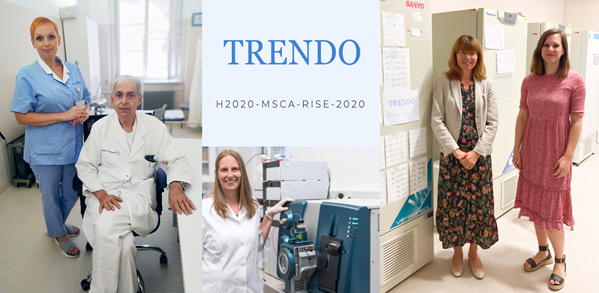University of Ljubljana, Faculty of Medicine (UL)

University of Ljubljana is represented by Laboratory for molecular basis of hormone-dependent diseases and biomarkers (http://ibk.mf.uni-lj.si/groups/LabTLR/research.html) at the Faculty of Medicine. The research interests of the laboratory headed by Prof. Dr. Tea Lanišnik Rižner are the roles of steroid hormones in etiology of steroid hormone dependent diseases and identification of novel drug targets and diagnostic biomarkers of these diseases. The laboratory is aiming to further the understanding of steroid actions in hormone-dependent diseases to contribute to the identification of novel drug targets and diagnostic/prognostic biomarkers using transcriptomic, proteomic and metabolomic approaches and to provide diagnostic and prognostic algorithms with high sensitivity and specificity for further clinical validation and application. The laboratory actively collaborates with the Department of Gynaecology and Obstetrics of the University Medical Centre Ljubljana in collection of tissue and blood samples from patients with different hormone dependent diseases including endometriosis.

So far the laboratory contributed to clarification of intracrine estrogen action in endometriosis (1) and endometrial cancer (2) and confirmed the importance of the sulfatase pathway and E1-S transporters in endometrial cancer (2-3). In the field of biomarker discovery the laboratory was the first to explore the metabolomics approach for identification of non-invasive biomarkers of endometriosis (4). This was followed by targeted proteomics and targeted metabolomics studies performed in endometriosis (5-7) and endometrial cancer. These studies identified panels of proteins and lipid biomarker candidates and constructed algorithms that included biomarkes and clinical data with good diagnostic potential. Currently the group is validating algorithms based on targeted metabolomics measuring levels of 630 metabolites on a large cohort of endometriosis and control patient from multinational study. Recently a targeted proteomics study using the antibody array approach evaluated levels of 1360 proteins in peritoneal fluid samples and identified cartilage oligomeric matrix protein (COMP) and transforming growth factor-β-induced protein ig-h3 (TGFBI) as candidate biomarkers (8). Further validation confirmed that TGFBI has good diagnostic characteristics also in plasma samples.
As a part of the TRENDO project, the laboratory will contribute a biobank of blood samples from patients with endometriosis and control disease-free women. This will enable the discovery and validation of novel biomarkers of endometriosis using transcriptomic and proteomic approaches. Along with that, expertise in targeted metabolomics will be used to evaluate steroid hormones metabolites as candidate biomarkers of endometriosis. These analyses will be explored in well characterised cohorts of women with endometriosis (with pain, with infertility) and healthy controls through steroid profiling by liquid chromatography tandem mass spectrometry (LC/MS/MS).
The key personnel in the TRENDO project include Asist. Prof. Maša Sinreih an expert in LSC/MS/MS and post-doctoral researcher Assist. Dr. Maja Pušić studying novel omics approaches in discovery of endometriosis biomarkers. Collaborators from University Medical Center Ljubljana, Assoc. Prof. Andrej Vogler and registered nurse Tatjana Lončar, provide invaluable support in recruiting patients and collecting blood samples.
1. HEVIR-KENE N. et al. Disturbed balance between phase I and II metabolizing enzymes in ovarian endometriosis : a source of excessive hydroxy-estrogens and ROS?. Mol. Cell. Endocrinol., 367, 74-84, doi: 10.1016/j.mce.2012.12.019.
2. SINREIH M. et al. The significance of the sulfatase pathway for local estrogen formation in endometrial cancer. Frontiers Pharmacol., 2017, 8, 368, doi: 10.3389/fphar.2017.00368.
3. PAVLIČ R. et al. Altered Profile of E1-S Transporters in Endometrial Cancer: Lower Protein Levels of ABCG2 and OSTβ and Up-Regulation of SLCO1B3 Expression. Int. J. Mol. Sci., 2021, 22, 3819. doi:10.3390/jpm10040294.
4. VOUK K. et al. Discovery of phosphatidylcholines and sphingomyelins as biomarkers for ovarian endometriosis. Hum. Reprod., 2012, 27, 2955-2965, doi: 10.1093/humrep/des152.
5. VOUK K. et al. Altered levels of acylcarnitines, phosphatidylcholines, and sphingomyelins in peritoneal fluid from ovarian endometriosis patients. J. Steroid Biochem. Mol. Biol., 2016, 159, 60-69, doi: 10.1016/j.jsbmb.2016.02.023.
6. KOCBEK V. et al. Panels of cytokines and other secretory proteins as potential biomarkers of ovarian endometriosis. Journal of Molecular Diagnostics, 2015, 17, 325-334, doi: 10.1016/j.jmoldx.2015.01.006.
7. KNIFIC T. et al. Multiplex analysis of 40 cytokines do not allow separation between endometriosis patients and controls. Scientific reports, 2019, 9, 1-12, doi: 10.1038/s41598-019-52899-8.
8. JANŠA V. et al. Proteomic analysis of peritoneal fluid identified COMP and TGFBI as new candidate biomarkers for endometriosis. Scientific Reports, 2021, 11, 20870. doi:10.1038/s41598-021-00299-2.

